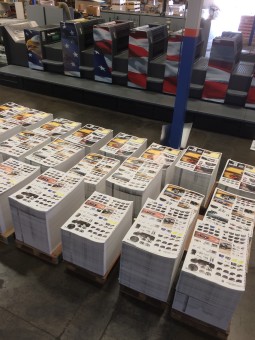
“Racing To Bring the Best”
The company catalog has long been the marketing standard for prosperous companies. A product catalog might be a companies best “salesperson”.
But nothing enjoys the “top dog” pedestal forever, and the catalog’s value has been challenged since digital marketing moved in to town.

Proline Catalog
For instance, 2014 was a strange year for catalog marketing. According to the Direct Marketing Association (thedma.org), only 11.8 billion catalogs were mailed that year. This represents a 40% decrease from prior years and the lowest number of catalogs shipped since the company started collecting this information in 2001. So why the huge decrease?
Since digital-focused marketing strategies have become increasingly important to retailers regardless of industry, it isn’t uncommon for them to go through the following phases to restructure and attempt to maximize ROI:
1. Reduce catalog mailings across the board
2. Use data to test new catalog formats and destinations
3. Find a link between existing channels and using that to boost sales
This is exactly what Lands’ End did, and the results were very interesting. The year after significantly decreasing the number of catalogs that were sent, they reported a $100 million decline in sales. After doing some more in-depth research on the decrease, they concluded that their consumers were more likely to spend money after viewing the catalog first – even if they only shopped online. From increased brand recognition to exposing customers to more products than they would see when conducting an online search, this made it clear to the company that the catalog was a key component to maintaining a robust multi-channel strategy and they immediately increased production back to normal levels the following year.

Time and time again, this research has made it clear that catalogs serve as a persuasive source of inspiration for many prospective buyers. Top brands that maintain a diverse, multi-channel strategy report that 58% of online shoppers say that they browse a catalog for ideas, and 31% of those say they returned to the website with catalog in hand to make a purchase. On top of this, women aged 18-30 are especially motivated by this type of direct marketing, claiming that they enhance their impression of a retailer, stimulate interest in a retailer’s products, and 86% have bought an item after first seeing it in a catalog. It’s hard to argue with those statistics.

For customers, multi-channel means having a seamless brand experience, regardless of how or when they’re accessing the brand. As the stats presented above make it clear, consumers still view catalogs as an important part of not only being exposed to the offerings of a brand, but also a important part of the purchasing decision process.

As retail strategy evolves with technology, catalogs continue to play a crucial role in multi-channel marketing. Knowing your audience and crafting these materials with a holistic viewpoint is key to increasing sales year after year. Here we shared a few catalogs we’ve proudly printed. Contact James Litho today to find out ways for your company to take advantage of these trends. jameslitho.com
